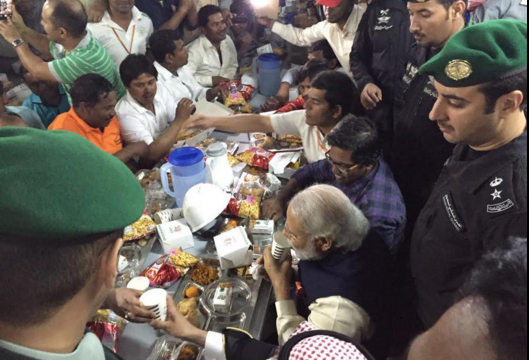Riyadh, Apr 2: In a special gesture, Prime Minister Narendra Modi today broke bread with a group of Indian workers of a major construction project here.

Modi sat with the workers at the L&T workers' residential complex and had the meal with them shortly after addressing them during which he appreciated their contribution to development of Saudi Arabia.
"Eating together, hearing each other's thoughts & experiences...at L&T Workers' Residential Complex in Saudi Arabia," the Prime Minister tweeted along with a picture of him having food with them.
The Prime Minister's gesture was hailed by the workers.
"This is unprecedented. We will not forget it ever," said a worker from Kerala.
The Indian blue collar workers are engaged in L&T's USD 2 billion housing project here.
There are over 2.96 million Indian nationals working in Saudi Arabia, the largest expatriate community in the country, and nearly 90 per cent of them are blue collar workers.
Earlier, while addressing the workers, Modi said, "Dear brothers, it is your sweat and toil that has brought me here."
The Prime Minister further said, "Your sweat and toil is the pride of India."
"Several times you and your dear ones have written to me, mentioning your hopes, heart breaks and expectations. I feel a part of your family," he said.
Hailing their contribution, Modi said India is uniquely qualified to satisfy the needs of manpower that the world requires today.
Mentioning about issues of migration, he said, the government has started a programme called "e-migrate" and it is working to regularise migration.
The Prime Minister asked the Indian workers to contact the government through the portal 'Madad', which was launched by Ministry of External Affairs to address the grievances of overseas Indians.
"Madad portal is a digital way of getting your voice to reach me. When our community faces troubles we reach out to them immediately," he said, adding "We will open more worker resource centres. A second 24X7 Call Centre will be established."
Also Read:
Modi holds talks with Saudi King to boost strategic ties
PM Modi calls upon Saudi businesses to invest in India
PM Narendra Modi visits TCS' all-women IT centre in Riyadh
Modi announces 24X7 helpline for NRIs; worker resource centres in Riyadh, Jeddah





Comments
L&T entered Saudi Arabia since 4-5 years only. Contribution to Saudi Arabia by Metro rail construction is still ongoing & is peanut compared to the eastern region SABIC petrochemicals projects, Hadeed Saudi Steel Industry(Worlds Largest) Aluminium Industry(MAADEN), SADARA(Worlds largest chemical complex), SATROP etc.
Unemployment at homeland force us to migrate since 1970.
Unfortunate part is that we termed as NRI doesn't have the voting rights and back home a hefty fees to be paid for our school children if they want to come back and study in India.
We ultimately become \ Na Ghar Ka Na Ghat Ka\"....once returned for good."
IN MEDIA - PM Shines
IN FIELD - PM vanishes...
Only Good at Drama. Fenku
Can do anything real except drama?
Bec before election he did same type of drama fooled everyone ...
Add new comment